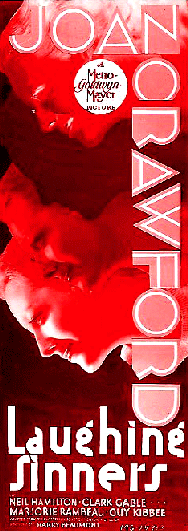
William Clark Gable was an American film actor. Often referred to as the "King of Hollywood", he had roles in more than 60 films in a variety of genres during a career that lasted 37 years, three decades of which was as a leading man. He was named the seventh greatest male movie star of classic American cinema by the American Film Institute.
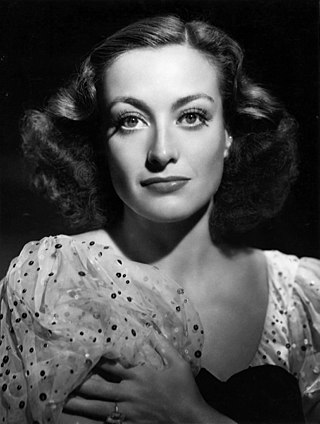
Joan Crawford was an American actress. She started her career as a dancer in traveling theatrical companies before debuting on Broadway. Crawford was signed to a motion picture contract by Metro-Goldwyn-Mayer in 1925. Initially frustrated by the size and quality of her parts, Crawford launched a publicity campaign and built an image as a nationally known flapper by the end of the 1920s. By the 1930s, Crawford's fame rivaled MGM colleagues Norma Shearer and Greta Garbo. Crawford often played hardworking young women who find romance and financial success. These "rags-to-riches" stories were well received by Depression-era audiences and were popular with women. Crawford became one of Hollywood's most prominent movie stars and one of the highest paid women in the United States, but her films began losing money. By the end of the 1930s, she was labeled "box office poison".

John Brown was an American college football player and film actor billed as John Mack Brown at the height of his screen career. He acted and starred mainly in Western films.

Torch Song is a 1953 American Technicolor musical drama film distributed by Metro-Goldwyn-Mayer and starring Joan Crawford and Michael Wilding in a story about a Broadway star and her blind rehearsal pianist. The screenplay by John Michael Hayes and Jan Lustig was based upon the story "Why Should I Cry?" by I.A.R. Wylie in a 1949 issue of The Saturday Evening Post. The film was directed by Charles Walters and produced by Sidney Franklin, Henry Berman and Charles Schnee. Crawford's singing voice was dubbed by India Adams.

Our Dancing Daughters is a 1928 American synchronized sound drama film starring Joan Crawford and John Mack Brown about the "loosening of youth morals" that took place during the 1920s. The film was directed by Harry Beaumont and produced by Hunt Stromberg. While the film has no audible dialog, it was released with a synchronized musical score with sound effects using both the sound-on-disc and sound-on-film process.

Marjorie Burnet Rambeau was an American film and stage actress. She began her stage career at age 12, and appeared in several silent films before debuting in her first sound film, Her Man (1930). She was twice nominated for the Academy Award for Best Supporting Actress for her roles in Primrose Path (1940) and Torch Song (1953), and received the 1955 National Board of Review Award for Best Supporting Actress for her roles in A Man Called Peter and The View from Pompey's Head.

Dancing Lady is a 1933 American pre-Code musical film starring Joan Crawford and Clark Gable, and featuring Franchot Tone, Fred Astaire, Robert Benchley, and Ted Healy and his Stooges. The picture was directed by Robert Z. Leonard, produced by John W. Considine Jr., and was based on the novel of the same name by James Warner Bellah, published the previous year. The movie had a hit song in "Everything I Have Is Yours" by Burton Lane and Harold Adamson.

The Joan Crawford filmography lists the film appearances of American actress Joan Crawford, who starred in numerous feature films throughout a lengthy career that spanned nearly five decades.

Love on the Run is a 1936 American romantic comedy film, directed by W.S. Van Dyke, produced by Joseph L. Mankiewicz, and starring Joan Crawford, Clark Gable, Franchot Tone and Reginald Owen in a story about rival newspaper correspondents assigned to cover the marriage of a socialite. The screenplay by John Lee Mahin, Manuel Seff and Gladys Hurlbut was based on a story by Alan Green and Julian Brodie. Love on the Run is the seventh of eight cinematic collaborations between Crawford and Gable. At the time of its release, Love on the Run was called "a lot of happy nonsense" by critics, but was a huge financial success, nonetheless.
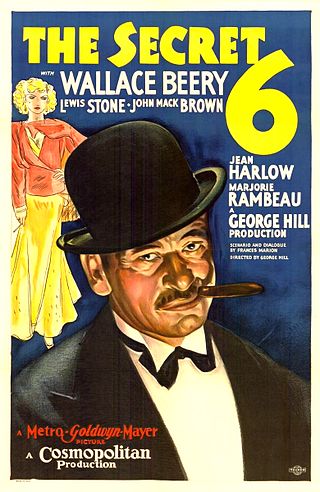
The Secret Six is a 1931 American pre-Code crime film starring Wallace Beery as "Slaughterhouse Scorpio", a character very loosely based on Al Capone, and featuring Lewis Stone, John Mack Brown, Jean Harlow, Clark Gable, Marjorie Rambeau and Ralph Bellamy. The film was written by Frances Marion and directed by George W. Hill for MGM.
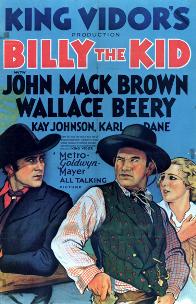
Billy the Kid is a 1930 American pre-Code Western film directed in widescreen by King Vidor about the relationship between frontier outlaw Billy the Kid and lawman Pat Garrett. In February 2020, the film was shown at the 70th Berlin International Film Festival, as part of a retrospective dedicated to King Vidor's career.
Great Day is an unfinished 1930 American pre-Code musical film, which was to star, in alphabetical order, Johnny Mack Brown, Joan Crawford, John Miljan, Anita Page, Marjorie Rambeau and John Charles Thomas.
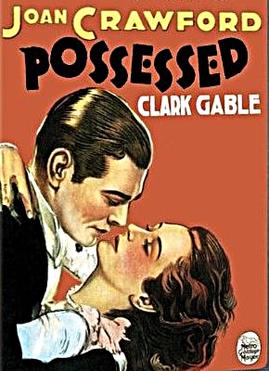
Possessed is a 1931 American pre-Code drama film directed by Clarence Brown, starring Joan Crawford and Clark Gable and released by Metro-Goldwyn-Mayer. The film is the story of Marian Martin, a factory worker who rises to the top as the mistress of a wealthy attorney. The screenplay by Lenore J. Coffee was adapted from the 1920 Broadway play The Mirage by Edgar Selwyn. Possessed was the third of eight film collaborations between Crawford and Gable.

Mickey's Gala Premier is a Walt Disney cartoon produced in 1933, directed by Burt Gillett, and featuring parodies of several famous Hollywood film actors from the 1930s. It was the 58th Mickey Mouse short film, and the eighth of that year.

Dance, Fools, Dance is a 1931 pre-Code Metro-Goldwyn-Mayer drama film starring Joan Crawford, Clark Gable, and Lester Vail in a story about a reporter investigating the murder of a colleague. Story and dialogue were created by Aurania Rouverol, and the film was directed by Harry Beaumont. Dance, Fools, Dance was the first of eight movies featuring Crawford and Gable.

This Modern Age is a 1931 American pre-Code Metro-Goldwyn-Mayer feature film directed by Nick Grinde and starring Joan Crawford, Neil Hamilton, Pauline Frederick and Albert Conti.

Forsaking All Others is a 1934 American romantic comedy-drama film directed by W.S. Van Dyke, and starring Robert Montgomery, Joan Crawford and Clark Gable. The screenplay was written by Joseph L. Mankiewicz, which was based upon a 1933 play by Edward Barry Roberts and Frank Morgan Cavett starring Tallulah Bankhead.

Strange Cargo is a 1940 American romantic drama film directed by Frank Borzage and starring Clark Gable and Joan Crawford in a story about a group of fugitive prisoners from a French penal colony. The adapted screenplay by Lawrence Hazard was based upon the 1936 novel, Not Too Narrow, Not Too Deep, by Richard Sale. The film was produced by Joseph L. Mankiewicz for Metro-Goldwyn-Mayer; it was the eighth and last film pairing of Crawford and Gable, and the first Gable picture released in the wake of Gone with the Wind. The supporting cast includes Ian Hunter, Paul Lukas, Eduardo Ciannelli, and Peter Lorre.
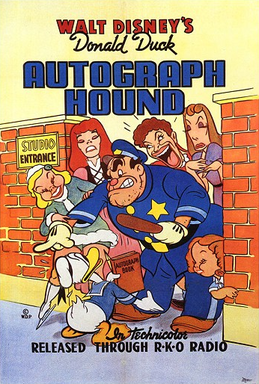
The Autograph Hound is a 1939 Donald Duck cartoon which features Donald Duck as an autograph hunter in Hollywood. Many celebrities from the 1930s are featured. This is the first cartoon where Donald Duck is featured in his blue sailor hat.

The Scarlett O'Hara War is a 1980 American made-for-television drama film directed by John Erman. It is based on the 1979 novel Moviola by Garson Kanin. Set in late 1930s Hollywood, it is about the search for the actress to play Scarlett O'Hara in the much anticipated film adaptation of Gone with the Wind (1939). This film premiered as the finale of a three-night TV miniseries on NBC called Moviola: A Hollywood Saga.
